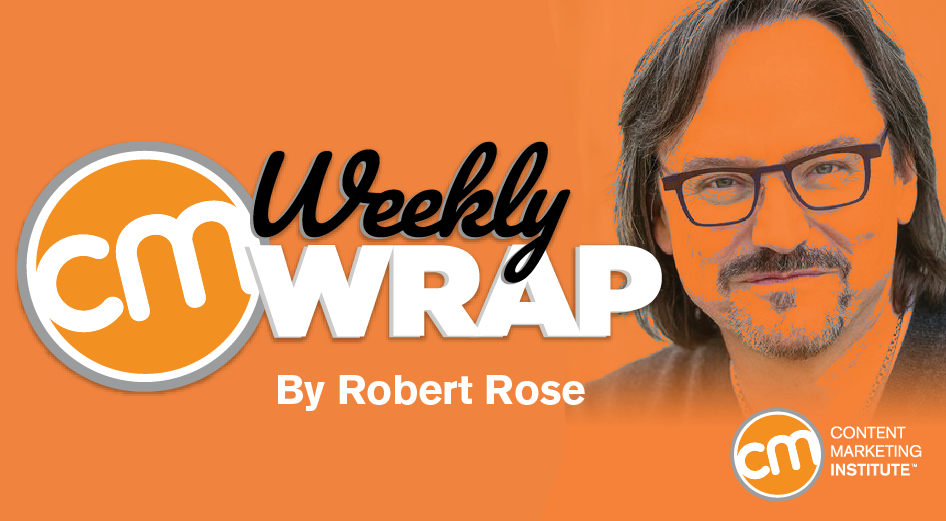
Listen to the Weekly Wrap here or subscribe on Apple Podcasts or Stitcher. If you enjoy the show, please take a moment to rate it or post a review.
And that’s a wrap of the week ending May 29, 2020
This week I’m wondering if we’re bouncing back – or forward. I offer my fresh take on how to plan for an economic bounce back. I talk with “unapologetic marketing truth teller” Katie Martell about the intersection of marketing and social movements. I share an article about the disruptive change we need now. And, for the first time, I offer you the choice to listen to the podcast or watch the new video version below. (Time stamps apply to the audio version.)
Listen to the Weekly Wrap
Our theme this week is resilience. It’s like replacing your favorite, ragged T-shirt after the washing machine finally destroys it. You get used to the new one … and it eventually becomes your favorite. That’s resilience.
Let’s wrap it up.
Listen to the episode:
Watch it, too:
One deep thought: Don’t worry about bouncing back (3:55)
You might say things right now are fluxed up.
Our best-laid plans and activities have been stretched, compressed, and generally bent out of shape over the past several months. Many of us wonder every day if this is the right time to come back, launch that big initiative we put on hold, return to the editorial calendar, resume selling the way we did before, or even go back to work (full stop).
In this environment, the word “resilience” gets brought up a lot. How resilient are we? Can we recover quickly from stresses and bounce back into our original shape?
Many frameworks have been developed to attempt to measure resilience (examples include the Connor-Davidson Resilience Scale, the Resilience Scale for Adults, and the Brief Resilience Scale).
But measuring resilience is difficult because resilience is observed after the successful negotiation of stresses. It’s a bit like those YouTube videos of people placing rubber band after rubber band around a watermelon until it explodes. You can’t measure how many rubber bands a watermelon can withstand until it fails. The number depends on the watermelon, strength of the bands, how quickly you place them, and so on.
That’s why most measurement frameworks simply try to identify positive attributes that give people or organizations the capacity for resilience. This capacity is the ability to change and to form new approaches to future stresses.
When I see resilience in marketing practices, it isn’t the team’s ability to get back to normal operations after a crisis that matters. It’s the team’s ability to adapt to the next version of normal.
Resilience in #marketing is the team’s ability to adapt to the next version of normal, says @Robert_Rose via @cmicontent. #WeeklyWrap Click To TweetI’m working with a content team now that, in the last 12 weeks, has had to reprioritize, revisit their content tech stack, and launch a set of new communications platforms with new workflows, standards, and guidelines. They’re not thinking of going back to the old. Their jobs are reshaped, their technology is retooled, and the governance and workflows remade. They’ve adapted.
HANDPICKED RELATED CONTENT:
A fresh take on what to plan for now (11:55)
This week’s news item comes from U.K.-based MarketingWeek: Marketers Should Be Planning for an Economic Bounce Back.
It opens with all the economic bad news that resulted from the pandemic-related stay-at-home orders. But then it looks ahead, pointing to forecasts for a “bounce back driven by pent-up demand that will see the economy back to where it was in 2019 by the end of next year or early 2022.”
The article’s point is, of course, that we should start planning for the bounce back now. I suggest that instead of planning for a bounce back, we plan for change.
Instead of planning for an economic bounce back, plan for change, says @Robert_Rose via @cmicontent. #WeeklyWrap Click To TweetRemember the fourth quarter of 2019 when people were worried about two dips in the yield curve in Treasury notes indicating a possible 2020 recession? Not a lot of people are talking about yield curves now. Is that because a recession was coming anyway? Or did the COVID-19 disaster create an artificial collapse and the “pent-up demand” bounce back would help us avoid recession? Or is the recession happening and we just don’t know?
I explain why it doesn’t really matter whether there’s a bounce back or a bounce backward. (Spoiler alert: Either way, you need to be ready for change.)
This week’s person making a difference in content: Katie Martell (16:54)
This week I talked with Katie Martell, a self-described “unapologetic marketing truth teller.”
A whip-smart B2B content marketing strategist, Katie was the executive director of Boston Content, a community of content practitioners, and was the chief marketing officer and co-founder of Cintell, a Boston-based B2B content marketing provider. A writer, speaker, and emcee, she hosts the live, social-platform-based Exceptional Truths.
We talked about the accelerated pace of change in B2B marketing and her upcoming documentary on the intersection of marketing and social movements.
Here’s a quick take from Katie:
We are more prepared for this moment than we give ourselves credit for. And I don’t blame us for feeling scared. I do believe we’re better suited to step up the way our companies need us to than we think.
Listen in, then learn more from Katie:
- Follow her on LinkedIn.
- Visit her website.
- Watch the Pandermonium trailer.
One content marketing idea you can use (32:04)
The one post on CMI’s site I’d love for you to take another look at is a piece I wrote about our recent research report: Content Management and Strategy: A Disruptive Change We Need [New Research].
As I wrote:
“‘These are scary times for managers in companies.’
“Twenty years ago, almost to the day, business strategist, author, and professor Clayton Christensen wrote those words to describe what was happening with the global economic crisis of the dot-com boom and globalization. In the introduction to the piece, he warns that before managers ‘rush into the breach, (they) must understand precisely what types of change the existing organization is capable and incapable of handling.’
“Here we are two decades later, and we’re feeling the exact same thing.”
In the research report, I take you through the (pre-COVID-19) research findings and the questions they raise that can help you prepare and adapt for the changes we need to make now. I hope you’ll give it a look.
Love for our sponsor: Sitecore
Organizations all over the world are being forced to reevaluate their business plans and marketing strategies. The luxury of being able to take a leisurely approach to a digital transformation is no longer an option.
Making human connections with customers in our suddenly digital-heavy world should be a top priority. And that means putting your digital transformation on the fast track.
Recognized by analysts as a leader in digital experience platforms, Sitecore can help you create memorable customer experiences that build brand trust and loyalty.
The wrap-up
Tune in again next week when I’ll share one deep thought that’ll let you know everything’s going tibia kay (and won’t be total below knee). I’ll offer my take on a news item you may find humerus. And I’ll share one spine-tingling content marketing tip that’s got your back. And it’ll all be delivered in a little less time than it takes for Lake of the Ozarks swimming pool to get really nasty.
If you have ideas for what you’d like to hear more of on our weekly play on words, let us know in the comments. And if you love the show, we’d sure love for you to review it or share it. Hashtag us up on Twitter: #WeeklyWrap.
How to subscribe

![]() Cover image by Joseph Kalinowski/Content Marketing Institute
Cover image by Joseph Kalinowski/Content Marketing Institute


